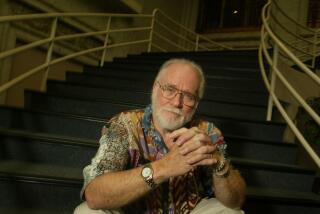PASSINGS: Martin Richards, Bryce Bayer
Martin Richards
Stage producer and philanthropist
Martin Richards, 80, a prominent stage producer who won an Oscar for producing the 2002 film “Chicago” decades after bringing it to Broadway, died Monday after a battle with cancer, said his publicist, Judy Jacksina.
Plays and musicals he produced over several decades won 36 Tonys. They include the 1978 musical “On the Twentieth Century”; Stephen Sondheim’s “Sweeney Todd” in 1979 and the 2005 revival; Tommy Tune’s “Grand Hotel” in 1989; the 1984 “La Cage Aux Folles” and 2004 revival; and “The Will Rogers Follies,” which debuted in 1991.
The son of a stockbroker, he was born Morton Richard Klein on March 11, 1932, in New York City and sang on Broadway as a child in the mid-1940s musical “Mexican Hayride.” When his voice changed, he continued singing in clubs in the 1950s and had small movie and TV roles before becoming a casting director in the 1960s.
He met Mary Lea Johnson — an heiress to the Johnson & Johnson pharmaceutical fortune — in the early 1970s and married her before the decade was out. Richards was openly gay, and for many years they lived in separate apartments in the same building. By all accounts, their personal and professional partnership was a happy one, according to Playbill.
The handful of films he co-produced included “The Boys From Brazil” (1978), “The Shining” (1980) and “Fort Apache, the Bronx” (1981).
When his wife died in 1990, Richards received a large inheritance. He was known to relish the good life but was also a generous philanthropist. He was a founding board member of Broadway Cares/Equity Fights AIDS, established a liver and kidney transplant center at the New York University Langone Medical Center and created the New York Center for Children to care for abused children and their families.
Bryce Bayer
‘Father of digital imaging’
Bryce Bayer, 83, an Eastman Kodak Co. researcher who has been called “the father of digital imaging” for the invention of a widely used color filter array that bears his name, died Nov. 13 in Bath, Maine. Direct Cremation of Maine announced his death but did not release a cause.
Since his Bayer filter was patented in 1976, it has been incorporated into nearly every digital camera and camera phone, according to Rochester, N.Y.-based Kodak.
“The elegant color technology invented by Bryce Bayer is behind nearly every digital image captured today,” Terry Taber, Kodak’s chief technology officer, said in a 2009 statement.
The filter allows devices to capture color images with a single sensor and paved the way for the development in the 1970s of the first working digital camera, Steve Sasson, the Kodak engineer responsible for that step forward, told the Rochester Democrat and Chronicle last week.
“He was solving a fundamental problem before that problem was even upon us,” Sasson said.
Bayer’s invention is the key reason that digital cameras are compact yet provide sharp-looking pictures, another former colleague, Ken Parulski, told the newspaper.
Bayer, who was born in 1929, also developed processes for storing, improving and printing digital images before retiring from Kodak in the mid-1990s.
— Los Angeles Times staff and wire reports
More to Read
Start your day right
Sign up for Essential California for news, features and recommendations from the L.A. Times and beyond in your inbox six days a week.
You may occasionally receive promotional content from the Los Angeles Times.



















































